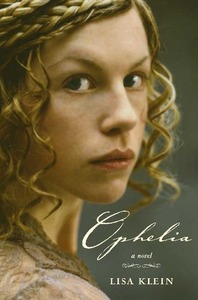Take a photo of a barcode or cover
I watched the movie before reading the book, which I don't recommend because the movie is more fast paced and feeds to the audience's desire to continuously experience feelings of admiration and grief one after the other. The novel is filled with deliberation, and gives the same vibe as a woman telling her story not for the merriment of other people, but for her own satisfaction, which is what the author intended. Ophelia is not so much as a retelling of the play Hamlet, as it is the narrative of a woman's own individual plights and story in relation to Hamlet. The novel also has a few subtle nods to it, as it displays Ophelia mentioning "stages" and "plays" in relation to the grander story that is playing in the background. I love Ophelia not as a retelling, but as an individual story separate from Hamlet.
A reimagining of the life of Ophelia in Hamlet. I thought this was a fun take on Ophelia's life. I have yet to come across anything else that tells the story from her point. There's magic and deceit. I thought the ending would be predictable but it was very different. Overall - I enjoyed it!
Oh, this is a great reimagining of the tragic story of Hamlet, but for Ophelia. Giving her a voice, light, and maybe a happy ending?
“...love enters through the eyes and strikes the soul.”
“Every hair on our heads is numbered, for we are more precious than any sparrow.”
The perfect read while teaching Hamlet.
“...love enters through the eyes and strikes the soul.”
“Every hair on our heads is numbered, for we are more precious than any sparrow.”
The perfect read while teaching Hamlet.
I watched the movie starring Daisy Ridley, and was happy to discover that it was fairly faithful to the book. It was fascinating to read the tragic romance from Ophelia's point of view.
He is Hamlet, Prince of Denmark; she is simply Ophelia. If you think you know their story, think again.
In this reimagining of Shakespeare's famous tragedy, it is Ophelia who takes center stage. A rowdy, motherless girl, she grows up at Elsinore Castle to become the queen's most trusted lady-in-waiting. Ambitious for knowledge and witty as well as beautiful, Ophelia learns the ways of power in a court where nothing is as it seems. When she catches the attention of the captivating, dark-haired Prince Hamlet, their love blossoms in secret. But bloody deeds soon turn Denmark into a place of madness, and Ophelia's happiness is shattered. Ultimately she must choose between her love for Hamlet and her own life. In desperation, Ophelia devises a treacherous plan to escape from Elsinore forever... with one very dangerous secret.
* * *
Ophelia is my absolute favorite play character of all time. She’s, in my opinion, Shakespeare’s greatest work within his greatest work (Hamlet is also my favorite play, and of course, in my eyes, the greatest play ever written.) So when I saw that my friends were reading this novel called Ophelia, I flipped and instantly ran out and bought it.
Lisa Klein did a great job reinventing Ophelia’s and Hamlet’s relationship, giving it life that we’ve never seen before in Shakespeare’s play, going behind the scenes to show you what happens. She delves into the common controversies regarding this play (such as: was Ophelia pregnant with Hamlet’s child? Was Ophelia really crazy? Did she really kill herself? {My answers to that are Yes, No, and Yes, all in that order.}) and Klein creates this intricate story around them.
I will admit that it started out amazing, and I was loving every moment of the plot twists and turns. I loved looking at the events of the play from a new, more modern perspective. But then half way through the story, things kinda took a turn for the weird, and then by the end, verged on “WTF just happened?” I have mixed emotions about this book, because I agreed with a lot of the things that Klein presented us with regarding the characters and the relationships between them, as well as motives that were vague in Shakespeare’s original work. But once she began distorting things to fit the plot, I kind of put it down and said “Okay, this is getting a little freaky.” But I always picked it back up again.
The writing was wonderful. I really feel that Klein stuck to the Shakespearean theme and tone, which is a ridiculously hard thing to do, so I applaud her for that.
The cover is not one of my favorites, mostly because that’s not how I picture Ophelia at all. Looking at the cover sort of distorts my image of her, so I’m not such a big fan of it.
Basically, if you’re not a Shakespeare enthusiast or not a Hamlet enthusiast, and are just looking for a good read, this is your book. If you are like me, you’ll find yourself nit-picking every little thing and, also like me, won’t enjoy it as much. It’s a toss-up, really. But I do recommend it.
Plot: 2/5
Characters: 4/5
Writing: 5/5
Creativity\Uniqueness: 3/5
Cover: 1.5/5
In this reimagining of Shakespeare's famous tragedy, it is Ophelia who takes center stage. A rowdy, motherless girl, she grows up at Elsinore Castle to become the queen's most trusted lady-in-waiting. Ambitious for knowledge and witty as well as beautiful, Ophelia learns the ways of power in a court where nothing is as it seems. When she catches the attention of the captivating, dark-haired Prince Hamlet, their love blossoms in secret. But bloody deeds soon turn Denmark into a place of madness, and Ophelia's happiness is shattered. Ultimately she must choose between her love for Hamlet and her own life. In desperation, Ophelia devises a treacherous plan to escape from Elsinore forever... with one very dangerous secret.
* * *
Ophelia is my absolute favorite play character of all time. She’s, in my opinion, Shakespeare’s greatest work within his greatest work (Hamlet is also my favorite play, and of course, in my eyes, the greatest play ever written.) So when I saw that my friends were reading this novel called Ophelia, I flipped and instantly ran out and bought it.
Lisa Klein did a great job reinventing Ophelia’s and Hamlet’s relationship, giving it life that we’ve never seen before in Shakespeare’s play, going behind the scenes to show you what happens. She delves into the common controversies regarding this play (such as: was Ophelia pregnant with Hamlet’s child? Was Ophelia really crazy? Did she really kill herself? {My answers to that are Yes, No, and Yes, all in that order.}) and Klein creates this intricate story around them.
I will admit that it started out amazing, and I was loving every moment of the plot twists and turns. I loved looking at the events of the play from a new, more modern perspective. But then half way through the story, things kinda took a turn for the weird, and then by the end, verged on “WTF just happened?” I have mixed emotions about this book, because I agreed with a lot of the things that Klein presented us with regarding the characters and the relationships between them, as well as motives that were vague in Shakespeare’s original work. But once she began distorting things to fit the plot, I kind of put it down and said “Okay, this is getting a little freaky.” But I always picked it back up again.
The writing was wonderful. I really feel that Klein stuck to the Shakespearean theme and tone, which is a ridiculously hard thing to do, so I applaud her for that.
The cover is not one of my favorites, mostly because that’s not how I picture Ophelia at all. Looking at the cover sort of distorts my image of her, so I’m not such a big fan of it.
Basically, if you’re not a Shakespeare enthusiast or not a Hamlet enthusiast, and are just looking for a good read, this is your book. If you are like me, you’ll find yourself nit-picking every little thing and, also like me, won’t enjoy it as much. It’s a toss-up, really. But I do recommend it.
Plot: 2/5
Characters: 4/5
Writing: 5/5
Creativity\Uniqueness: 3/5
Cover: 1.5/5
Entering my reviews over from my old Goodreads profile I unearthed recently...here are some super sappy thoughts from 2009-era 14-year-old Claire!
I haven't yet read Hamlet, but the story is familiar all the same. This book delves into the character of Ophelia, explores her suicide. And the result is captivating. Also, it made me cry, and I love crying because of books.
I haven't yet read Hamlet, but the story is familiar all the same. This book delves into the character of Ophelia, explores her suicide. And the result is captivating. Also, it made me cry, and I love crying because of books.
medium-paced
Plot or Character Driven:
Character
Strong character development:
Complicated
This is a book that I was so excited to read because I love Shakespeare's works and I often really enjoy people's adaptations and interpretations of his stories. However, this one was really tiring and I felt it was a bit pedantic.
While I can appreciate what the author was trying to do with this story by adding depth and drama to it, I just didn't enjoy how she went about it. I can't tell if it was her writing style, hers choices in plot direction, or what, but it made for an unpleasant experience. At the end of the book I just didn't feel any sort of satisfaction, or emotion really, just disappointment.
While I can appreciate what the author was trying to do with this story by adding depth and drama to it, I just didn't enjoy how she went about it. I can't tell if it was her writing style, hers choices in plot direction, or what, but it made for an unpleasant experience. At the end of the book I just didn't feel any sort of satisfaction, or emotion really, just disappointment.
Oh, this is a great reimagining of the tragic story of Hamlet, but for Ophelia. Giving her a voice, light, and maybe a happy ending?
“...love enters through the eyes and strikes the soul.”
“Every hair on our heads is numbered, for we are more precious than any sparrow.”
The perfect read while teaching Hamlet.
“...love enters through the eyes and strikes the soul.”
“Every hair on our heads is numbered, for we are more precious than any sparrow.”
The perfect read while teaching Hamlet.
Must be one of the best books I've ever read!!! It's just basically another take on Shakespeare's "Hamlet". I think this book is very feminist, but it would appeal to anyone and everyone.
This book is so captivating, as it follows Ophelia watching her childhood crush Hamlet grow up. From this book, you can truly feel how much Ophelia loves Hamlet, and how strong and wise women can be when they are forced into desperate situations for the one they love.
I totally love that little twist near the end, when
Oh, Ophelia, you will live on forever in my heart!
This book is so captivating, as it follows Ophelia watching her childhood crush Hamlet grow up. From this book, you can truly feel how much Ophelia loves Hamlet, and how strong and wise women can be when they are forced into desperate situations for the one they love.
I totally love that little twist near the end, when
Spoiler
Ophelia finds out she really is pregnant, and with Hamlet's child no less!!!! However, I'm conflicted about the final relationship between Horatio and Ophelia...Oh, Ophelia, you will live on forever in my heart!
Another great book from Lisa M. Klein. As she states in her afterword, this gives more of a story to Ophelia and offers her the role of a strong woman (not crazy, if I remember correctly from my Shakespeare-reading high school days). A heartbreaking story at times, it truly showcases one girl-to-woman's story of finding herself and conquering life's battles.





